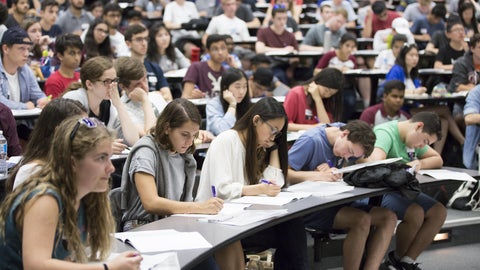
The pandemic and current global events have heightened awareness of existing global challenges, and highlighted the important role universities play in uncovering solutions and developing talent
By: Vivek GoelPresident and Vice-Chancellor
Yesterday, many of us across Ontario exercised our democratic right to vote in the provincial election. It can be easy to take this simple, recurring action for granted, but in recent years we have been reminded just how precious this fundamental right is and the importance of our civic duties.
The pandemic and current global events have heightened awareness of existing global challenges such as the rise of populism and nationalism, the decline of global multi-literalism, the polarization of politics, armed conflicts, and structural inequities in the world, particularly the legacy of centuries of colonization. We also face an urgent existential threat to our world with the climate crisis. We continue to witness extreme weather events locally and globally.
During such challenging times, universities play an important role in finding solutions based on fundamental and applied research and developing talent through high quality education. The contributions range from stemming climate change to curing diseases to mitigating geopolitical tensions. Academia also plays a vital role in preserving and enhancing democracy by offering a safe place for free inquiry and preparing our students to be global citizens. At Waterloo, our focus on experiential learning provides an even greater opportunity to learn in diverse environments.
Our students are our best avenue for mobilizing our knowledge and solutions out into the world. They take what they have learned on our campuses and bring that knowledge to their workplaces, to the business and ventures they create, and to the communities they live in. We are not only educating the next generation of talent, we are helping to shape the citizenry of the future.
As institutions of higher learning, we have a responsibility to educate and empower our students to participate in society and understand how the work they do and the decisions they make affect the world around them. The massive global upheaval we have seen over the past two years has underscored the importance of this duty.
As a society, we have become rather short-term in our thinking. The global pandemic has highlighted the dangers of this. For example, when we don’t experience disease outbreaks for a period of time, public health funding gets cut. The same applies to areas such as the environment or cyber security. Preventive measures are under-valued in society today. Universities need to prepare the next generation to think about the longer term. We can enable them to be good global citizens.
To help our graduates contribute meaningfully in society, universities can equip students with the tools they need to better understand the world around them. In today’s world of information overload and rising misinformation, basic data and information literacy are key.
Data literacy helps us better understand the data we are looking at, which helps us make more informed decisions. Regardless of discipline, every graduate should have a foundational level of data and information literacy to help them with their own decision making—whether it is about which vaccine is safest, how to critically read articles fed to them through algorithms (and to understand the algorithms!), or how to make voting decisions.
An interdisciplinary education can also help students better understand how their education relates to broader society. For example, those developing artificial intelligence should understand how AI interacts with humans and the ethical implications of this. Or, a finance student can benefit from deepening their knowledge of environmental issues to better understand how climate change affects financial markets and business decisions.
As a leader in co-op education, the University of Waterloo sees the benefits of early pathways to engage with industry or gaining work experience in the public or non-profit sectors. Students learn early on about the industries they aspire to work and lead in and how what they learn in the classroom carries meaning in real world settings. They see first-hand the human and societal implications of their work.
As institutions of higher learning, universities are training our graduates to be leaders and innovators across disciplines such as health, advanced manufacturing, quantum technologies and climate sustainability to name a few. Graduates equipped with data and information literacy, a combination of technical and humanistic training, and early exposure to the workplace enter their careers as the creative problem solvers their sectors need to develop human-centered solutions. Importantly, they also enter the world ready to participate in society as good global citizens.